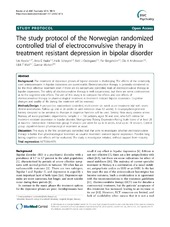| dc.description.abstract | Background The treatment of depressive phases of bipolar disorder is challenging. The effects of the commonly used antidepressants in bipolar depression are questionable. Electroconvulsive therapy is generally considered to be the most effective treatment even if there are no randomized controlled trials of electroconvulsive therapy in bipolar depression. The safety of electroconvulsive therapy is well documented, but there are some controversies as to the cognitive side effects. The aim of this study is to compare the effects and side effects of electroconvulsive therapy to pharmacological treatment in treatment resistant bipolar depression. Cognitive changes and quality of life during the treatment will be assessed. Methods/Design A prospective, randomised controlled, multi-centre six- week acute treatment trial with seven clinical assessments. Follow up visit at 26 weeks or until remission (max 52 weeks). A neuropsychological test battery designed to be sensitive to changes in cognitive function will be used. Setting: Nine study centres across Norway, all acute psychiatric departments. Sample: n = 132 patients, aged 18 and over, who fulfil criteria for treatment resistant depression in bipolar disorder, Montgomery Åsberg Depression Rating Scale Score of at least 25 at baseline. Intervention: Intervention group: 3 sessions per week for up to 6 weeks, total up to 18 sessions. Control group: algorithm-based pharmacological treatment as usual. Discussion This study is the first randomized controlled trial that aims to investigate whether electroconvulsive therapy is better than pharmacological treatment as usual in treatment resistant bipolar depression. Possible long lasting cognitive side effects will be evaluated. The study is investigator initiated, without support from industry. | en_US |

